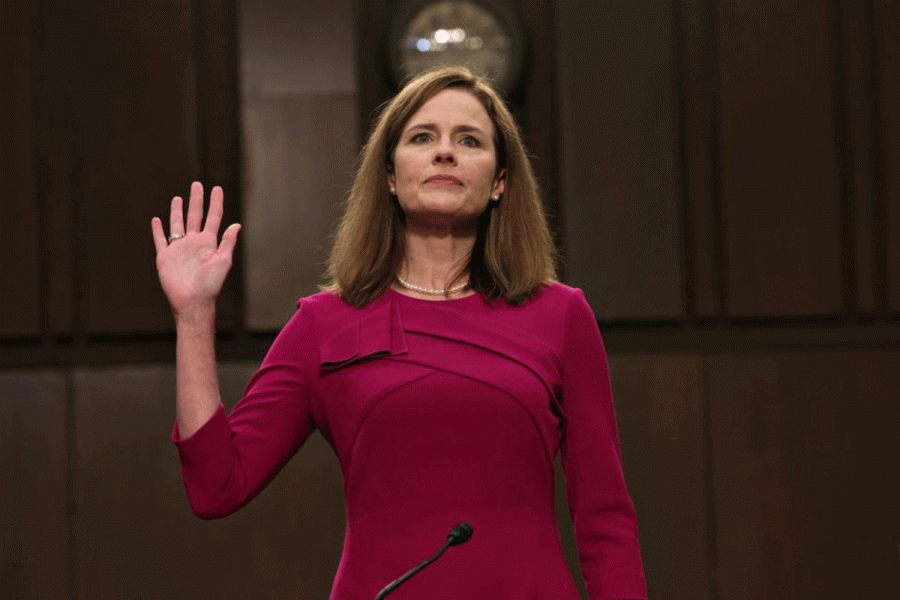A New Court
Students react to Justice Barrett’s confirmation
Photo: Wikimedia Commons/Lucy Sanders (CC BY-SA 4.0)
According to the Associated Press, Barrett is the first justice not to receive a single vote from the minority political party in the Senate.
“I fear for their lives.”
Librarian Leah Griffin was referring to minority groups, and specifically those protected by the Affordable Care Act, who may be affected by Justice Amy Coney Barrett’s confirmation to the Supreme Court on Oct. 26. Griffin is an advocate for local legislation, such as her most recent endeavor advocating for Washington State’s sex education bill that passed on Nov. 3.
Other advocates such as junior and member of the Planned Parenthood Teen Council Tessa Peterson are also concerned by Barrett’s confirmation.
“[Barrett’s confirmation] was definitely a step back for women’s rights and the rights of many people,” Peterson said. “I know that her stance and what she has said in the past about women’s healthcare is very conservative-leaning and very frightening for many girls and women across the country.”
While Barrett has not yet heard any cases specifically regarding abortion on the Supreme Court, she did rule in favor of a law requiring parental consent before minors are allowed to have an abortion in 2018 on a lower court.
And in 2016, Barrett talked about the hypothetical future of a conservative court under the Trump Administration and its implications on Roe v. Wade, the monumental 1973 Supreme Court case legalizing abortion.
“I think don’t think the core case – Roe’s core holding that women have a right to an abortion – I don’t think that would change. But I think the question of whether people can get very late-term abortions, how many restrictions can be put on clinics – I think that would change,” Barrett said in the video recording of her address.
According to University of Washington Professor of Law Eric Schnapper, politically-charged cases such as ones on abortion do not commonly appear in the Supreme Court.
“The number of cases that break along ideological lines are certainly in the minority,” Schnapper said.
Currently, the Supreme Court is not set to hear any abortion-related cases; however, according to Schnapper, that may change as there is now a 6-3 conservative majority. For example, conservatives are more likely to win an abortion-related case.
“For the cases that are ideologically frayed,” Schnapper said, “the liberals may be less keen on taking cases because they don’t think they will get five votes. That being said, the conservatives only need four votes to grant review.”
According to sophomore Talia LeVine, even if a Supreme Court decision challenged abortion protections, for example, Washington State citizens would still be largely protected.
“Since we live in a predominantly blue state, the decisions [Barrett] makes and the cases she decides won’t have a huge impact on us here,” LeVine said.
Because local governments and communities do have an impact, Griffin, LeVine and Peterson all believe members of the UPrep community can help those who may be feeling vulnerable.
In addition to participating in University Prep’s many advocacy clubs such as Gender Equity and the Queer Student Union, Griffin recommends students advocate for bills in the state Senate by writing letters to lawmakers, lobbying at the state’s capitol and sharing their stories through journalism, such as letters to the editor.
“People in Washington State have the power to affect local policy to protect people from [Supreme Court] decisions that may loosen discrimination policies nationwide,” Griffin said. “You don’t have to have special training or special knowledge to get involved. ”
To support reproductive rights, Peterson recommends that students volunteer their time at organizations such as Planned Parenthood and donate to organizations such as the Northwest Acess Fund.
Moreover, LeVine hopes UPrep students and students privileged enough not to fear the impacts of upcoming Supreme Court rulings will support those who do.
“Support your friends that are in marginalized communities that are under attack by the supreme court,” LeVine said. “Make sure they know you are there for them, and you care what happens.”
Your donation will support the student journalists of UPrep.


